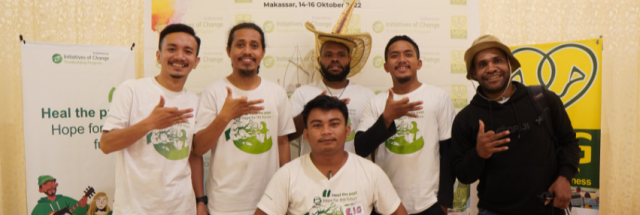Like a ray of light, Hano Wene was born to bring hope for improving literacy in Papua. Hano Wene, which means “good news” in the local Tangma language of Papua, is a movement initiated by young people who care about education. They aim to build libraries and reading gardens in remote villages deep in the Papuan interior.

Neas is the man with the hat.
Neas Wanimbo, the founder of Hano Wene, was inspired by his experiences growing up in the Papuan interior. He remembers how difficult it was to access books and quality education. “We believe that only through education can we change our way of thinking and our way of life,” said Neas.
Neas also took the initiative to lead, spurred by his unease with the surrounding conditions. For Neas, leading an initiative takes work. “I am not perfect, I am not honest, I am too selfish and I do not love my fellow human beings. I face many challenges, but the four standard values of IofC help me with every decision I make in the organization,” said Neas. He also introduced the practice of Quiet Time in the organization. “Quiet time and sharing are part of our routine three times a week,” he added.
Since its establishment in 2017, Hano Wene has reached various regions in the provinces of Papua, West Papua, and Maluku. They have set up 11 reading gardens and worked hand in hand with local communities. Positive impacts have begun to appear, with a 20% increase in reading interest among children in Tangma Village, Yahukimo Regency, and a reduction in illiteracy rates by up to 65%.
However, Hano Wene’s journey has not always been smooth. Geographic challenges and transportation access are the main obstacles in distributing books. “Sometimes, the places we want to help are very far away. We have to carry the books on foot,” Neas explained. Rommy Dumbery, a Hano Wene activist, added that to reach some locations, they must travel by sea for 36 hours, followed by a challenging overland journey. “Sometimes the roads are muddy, at risk of landslides, the weather is hard to predict, and not to mention the expensive transportation,” Neas added.
Additionally, Hano Wene faces challenges in terms of book quality and contextualization. Many donated books are in poor condition or not relevant to Papua’s local context. Limited human resources and funding also pose hurdles that must be overcome.
Even so, the volunteers’ spirit at Hano Wene never dims. They continue to kindle a spirit of collaboration. They strive to involve various stakeholders from tribal leaders, religious figures, and youth to security personnel, to ensure the continuity of their programs.
Hano Wene does not only focus on providing books but also supports volunteer teachers who serve in the interior. They have assisted five teachers and provided stationery and decent clothing to more than 500 children in remote villages.
Going forward, Hano Wene hopes to expand its network and collaborate with various sectors, including NGOs, the government, and the private sector, to develop better educational infrastructure in Papua’s interior. “Our human resources are still far behind, and programs like this are extremely needed right now in Papua,” stressed Neas.
Through Hano Wene, Neas and his colleagues not only bring books but also hope and opportunities for Papuan children to see a wider world through the window of literacy. They believe that by increasing reading interest and access to education, Papua’s younger generation will have better opportunities to build their future and the future of their region. May good news continue to come to Hano Wene and their friends in Papua.
Neas Wanimbo
Editor: Ari Budi S
Proofread: Peter Heyes

